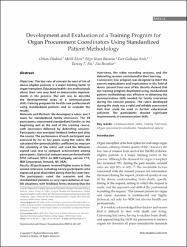| dc.contributor.author | Odabaşı, Orhan | |
| dc.contributor.author | Elçin, Melih | |
| dc.contributor.author | Uzun Başusta, Bilge | |
| dc.contributor.author | Gülkaya Anık, Esin | |
| dc.contributor.author | Aki, Tuncay Fazıl | |
| dc.contributor.author | Bozoklar, Ata | |
| dc.date.accessioned | 10.07.201910:49:13 | |
| dc.date.accessioned | 2019-07-10T19:50:23Z | |
| dc.date.available | 10.07.201910:49:13 | |
| dc.date.available | 2019-07-10T19:50:23Z | |
| dc.date.issued | 2018 | en_US |
| dc.identifier.citation | Odabaşı, O., Elçin, M., Uzun Başusta, B., Gülkaya Anık, E., Aki, T. F. ve Bozoklar, A. (2018). Development and evaluation of a training program for organ procurement coordinators using standardized patient methodology. Experimental and Clinical Transplantation, 16(4), 481-487. | en_US |
| dc.identifier.issn | 1304-0855 | |
| dc.identifier.uri | https://dx.doi.org/10.6002/ect.2015.0131 | |
| dc.identifier.uri | https://hdl.handle.net/20.500.12511/1968 | |
| dc.description | WOS: 000442098600019 | en_US |
| dc.description | PubMed ID: 26643104 | en_US |
| dc.description.abstract | Objectives: The low rate of consent by next of kin of donor-eligible patients is a major limiting factor in organ transplant. Educating health care professionals about their role may lead to measurable improvements in the process. Our aim was to describe the developmental steps of a communication skills training program for health care professionals using standardized patients and to evaluate the results. Materials and Methods: We developed a rubric and 5 cases for standardized family interviews. The 20 participants interviewed standardized families at the beginning and at the end of the training course, with interviews followed by debriefing sessions. Participants also provided feedback before and after the course. The performance of each participant was assessed by his or her peers using the rubric. We calculated the generalizability coefficient to measure the reliability of the rubric and used the Wilcoxon signed rank test to compare achievement among participants. Statistical analyses were performed with SPSS software (SPSS: An IBM Company, version 17.0, IBM Corporation, Armonk, NY, USA). Results: All participants received higher scores in their second interview, including novice participants who expressed great discomfort during their first interview. The participants rated the scenarios and the standardized patients as very representative of real-life situations, with feedback forms showing that the interviews, the video recording sessions, and the debriefing sessions contributed to their learning. Conclusions: Our program was designed to meet the current expectations and implications in the field of donor consent from next of kin. Results showed that our training program developed using standardized patient methodology was effective in obtaining the communication skills needed for family interviews during the consent process. The rubric developed during the study was a valid and reliable assessment tool that could be used in further educational activities. The participants showed significant improvements in communication skills. | en_US |
| dc.language.iso | eng | en_US |
| dc.publisher | Başkent University | en_US |
| dc.rights | info:eu-repo/semantics/openAccess | en_US |
| dc.subject | Communication Skills | en_US |
| dc.subject | Family Interview | en_US |
| dc.subject | Organ Procurement Coordinator | en_US |
| dc.subject | Standardized Patient | en_US |
| dc.title | Development and evaluation of a training program for organ procurement coordinators using standardized patient methodology | en_US |
| dc.type | article | en_US |
| dc.relation.ispartof | Experimental and Clinical Transplantation | en_US |
| dc.department | İstanbul Medipol Üniversitesi, Tıp Fakültesi, Cerrahi Tıp Bilimleri Bölümü, Organ Nakli Ana Bilim Dalı | en_US |
| dc.identifier.volume | 16 | en_US |
| dc.identifier.issue | 4 | en_US |
| dc.identifier.startpage | 481 | en_US |
| dc.identifier.endpage | 487 | en_US |
| dc.relation.publicationcategory | Makale - Uluslararası Hakemli Dergi - Kurum Öğretim Elemanı | en_US |
| dc.identifier.doi | 10.6002/ect.2015.0131 | en_US |
| dc.identifier.wosquality | Q4 | en_US |
| dc.identifier.scopusquality | Q3 | en_US |


















